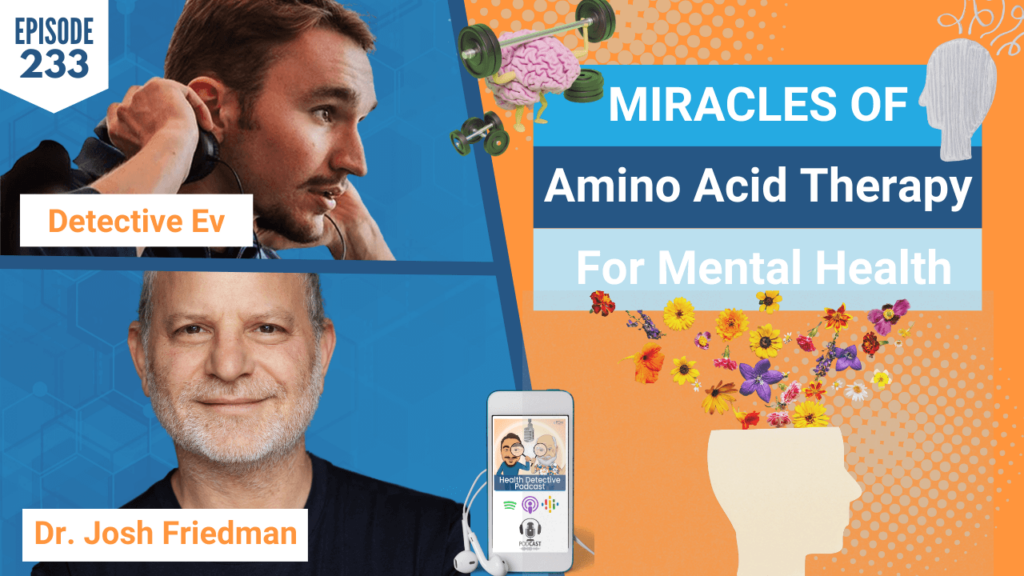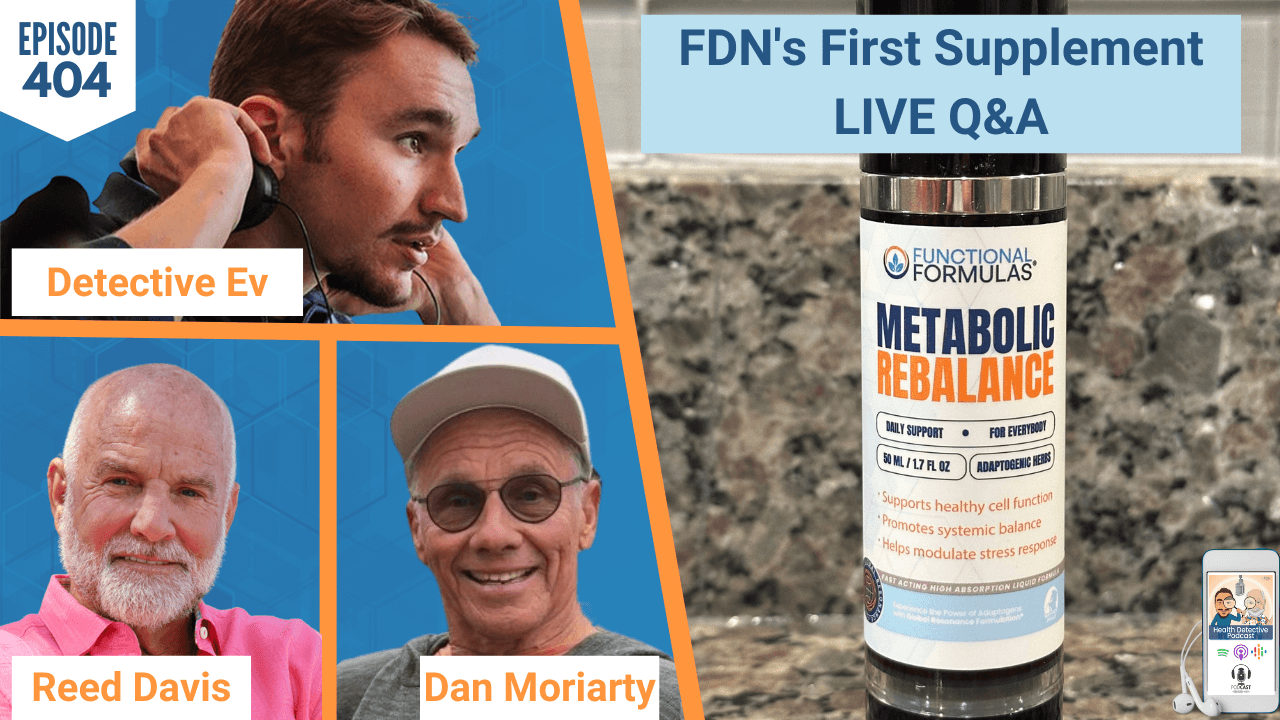Introduction
[00:00:00] Detective Ev: Well, hello my friends. Welcome back to another episode of the Health Detective Podcast by Functional Diagnostic Nutrition. My name is Evan Transue, aka Detective Ev. I will be your host for today’s show on amino acid therapy. We have a great one for you today.
We’re going to be talking about mental health, but not in any simple way. We’re talking to Dr. Josh Friedman. I will explain who he is in just a moment. I’ll put it this way to start out, he is someone who has been studying in this natural space for a couple of decades. When we are lucky enough to get someone on the show who has been doing that, these people just have so much information in their head. It is crazy what he rattles off.
So, this might be one of those times if you’re really passionate about the mental health stuff or you’re working with clients who have these issues, I would be taking notes. He also gave us a phenomenal resource, which will be in the show notes. It will make more sense as you get to listen to what we’re talking about today because we’ll touch on a few subjects.

But one of the main things is amino acid therapy. As long as I’ve been in this space myself, I’m amazed by how not often I hear about this. I know that’s not proper grammar, but you know what I mean. I don’t hear about this very often, and it’s something that works super well. It’s practically completely safe and it is ridiculously cheap. You think we’d want to know more about that.
Anyway, before we get into Dr. Friedman’s bio, a couple quick things.
Announcements
One, if you’re listening to this, we have just finished up at KetoCon 2023. I’m assuming it was a great event. I recorded this before that, obviously, but KetoCon is always a great time. If you saw us, awesome. If you missed us. We hope to see you next year. I’m sure we’ll be back.
The next event that you could see some of us at, at least myself and maybe another couple volunteers will be CellCore’s event in May. I believe that’s May 18th, 19th, 20th. I will be in Boise, Idaho for that event. You can come catch me at the booth and we should have another couple FDNs there, but I’m not sure who that’s going to be yet. That’ll be the next place that you can check us out.
Last announcement for today, so many people don’t realize they can communicate with us very easily and very directly. All you ever have to do is go to our Instagram at fdntraining. We don’t use chatbots on there. We have a real person or set of people who staff that and can answer any questions that you have. They’ll respond to you within a couple of hours, typically, as long as it’s within normal business hours for the United States. That’s fdntraining, check us out there.
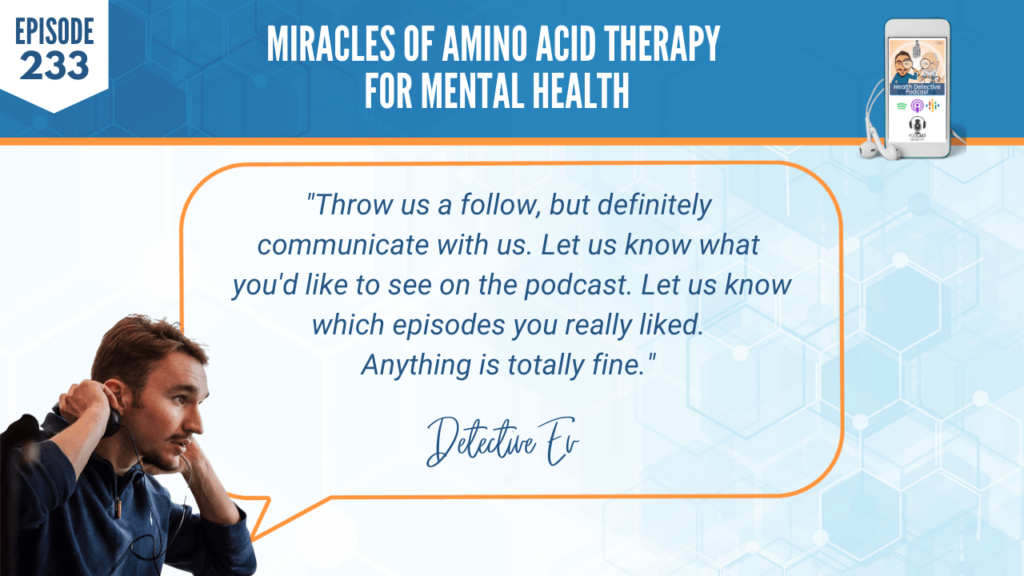
Throw us a follow, but definitely communicate with us. Let us know what you’d like to see on the podcast. Let us know which episodes you really liked. Anything is totally fine.
With all that said, here is a little bit about Dr. Friedman before we get rolling today.
A Little About Dr. Josh Friedman
He earned his doctorate in psychology from New York University and did post-doctoral training in psychoanalysis from the Training and Research Institute for Self-Psychology (TRISP) in New York City. After working in the field for a few years, he realized that something was missing from traditional mental health treatment. Go figure, right?
Curiosity and a chance meeting led him to discover the world of nutritional psychology, which teaches that many psychological issues are actually caused or made worse by underlying biochemical or nutritional deficiencies. Along the way, he became certified as a yoga teacher, incorporating the emphasis on breathing techniques, meditation, and movement into his work as essential tools for working with mental health at the deepest levels.
To enhance his effectiveness in helping people heal and grow, he also became certified as a Holistic Health Counselor at the Institute for Integrative Nutrition, and he went on to earn a Diploma of Comprehensive Nutrition (Dip.CN) from Huntington College of Health Sciences.
He has been led to go deeper into the biochemistry of mental health by becoming a Certified Functional Medicine Practitioner, a Functional Diagnostic Practitioner, and also studying with mental health nutrition greats such as Julia Ross, MA, Dr. Charles Gant, MD, and Dr. William Walsh, Ph.D. So, you know, the guy’s kind of educated in this kind of stuff, right?

He started Alternative Mental Health Solution, that’s his business, to help people find and fix the root causes of their mental health struggles. This is going to be an awesome one today, especially if you are passionate about the mental health stuff. Without further ado, let’s get to today’s episode.
Alright. Hello there, Dr. Friedman. Welcome to the Health Detective Podcast. How are you?
Amino Acid Therapy: Anxious, Depressed, and Frozen
[00:04:04] Dr. Josh Friedman: I’m doing great. Thanks so much for having me.
[00:04:05] Detective Ev: Dr. Friedman and I had done this several years ago on a very small podcast that I had. He was nice enough to come on. It’s awesome to be able to bring him onto a platform where he can really share this message with people. You have something very unique to say.
In 200 something episodes, I have not had one single guest come on and talk about the things that you focus on in the world of mental health. Obviously, you do a lot more than just this today. But if this can help even one practitioner out there, we know it’s worth it cause this is quite literally lifesaving stuff depending on the client that we are dealing with. I don’t want to tease people too much, but we’ll get to that part in a second.
It’s worth mentioning your background and where you came from. I actually barely remember at this point. How did you go from quote/unquote “standard psychology” to the more holistic side? What was your background in that?
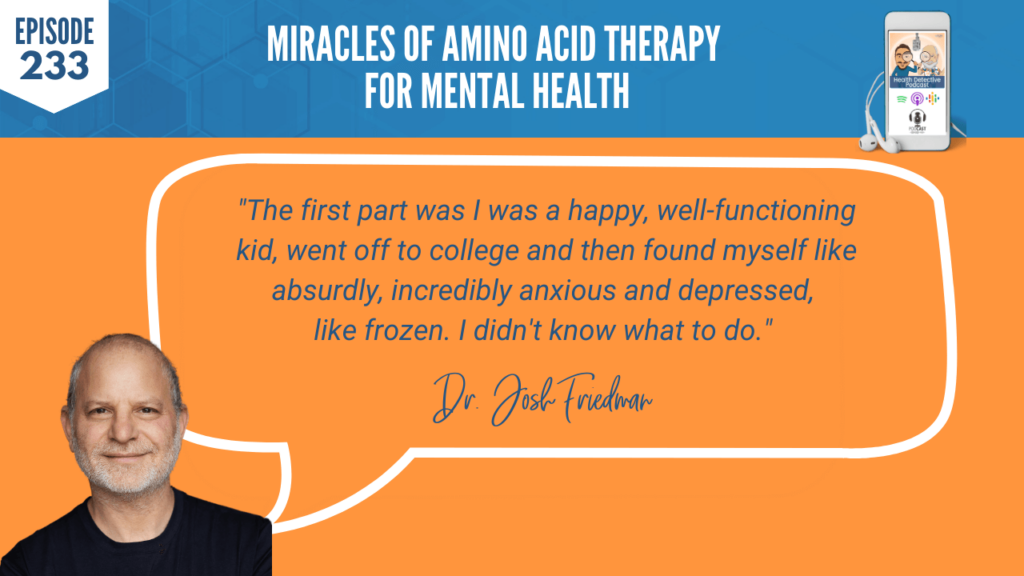
[00:04:53] Dr. Josh Friedman: I had a two-pronged background. The first part was I was a happy, well-functioning kid, went off to college and then found myself like absurdly, incredibly anxious and depressed, like frozen. I didn’t know what to do. I went the therapy route and then I went the psychiatric route. It took me a long time to sort of figure out first how to find a good therapist.
I went through five or six therapists before I found someone that was helpful. I tried five or six meds until I found something that was helpful; it was sort of only partially helpful.
Amino Acid Therapy: Nutrition in Psychology?
Now there’s so much information out there, but I had a really good therapist who was very open-minded, who taught me about yoga. So, I started doing yoga. From yoga, I started to learn about nutrition. From nutrition, I had a chance meeting with someone who said, (I was a therapist by now), he was like, do you know why the antidepressants don’t work that your eating disorder patients were on? I was working at kind of a well-known eating disorder clinic in New York City. I said, I don’t know, cause they’re depressed.
He said something that changed everything for me. He said, because they don’t eat enough protein. I had done seven years of training in psychotherapy; I had done two years of training in psychoanalysis. No one had ever told me that brain chemistry was made from protein. So, I was like, what?
He was a chiropractor on Long Island, this was before functional medicine. A chiropractic nutritionist is what he called himself. He handed me a book; it was The Mood Cure by Julia Ross. So, this is like about 25 years ago now, and I read it in one sitting.

I was amazed that no one had put the nutritional pieces together in any comprehensive way for me. No one had ever mentioned anything about nutrition in 10 years of training as a psychologist except to say people should eat well, they should eat balanced diets, the real basics. Like alcohol can lead to problems, but no one dove into even one step deeper than that.
Amino Acid Therapy: These Things Don’t Mix
So, I had this Bible, and I was like, this is amazing. I went back to this team of people that I was working with, a psychiatrist, dietician, our therapist, psychiatrist, and I said, look at this book. It’s talking about these things called amino acids. We can start to treat these conditions naturally. It’s talking about essential fatty acid deficiencies, it’s talking about candida, it’s talking about like magnesium deficiencies. And there was nothing; there was just a blank stare.
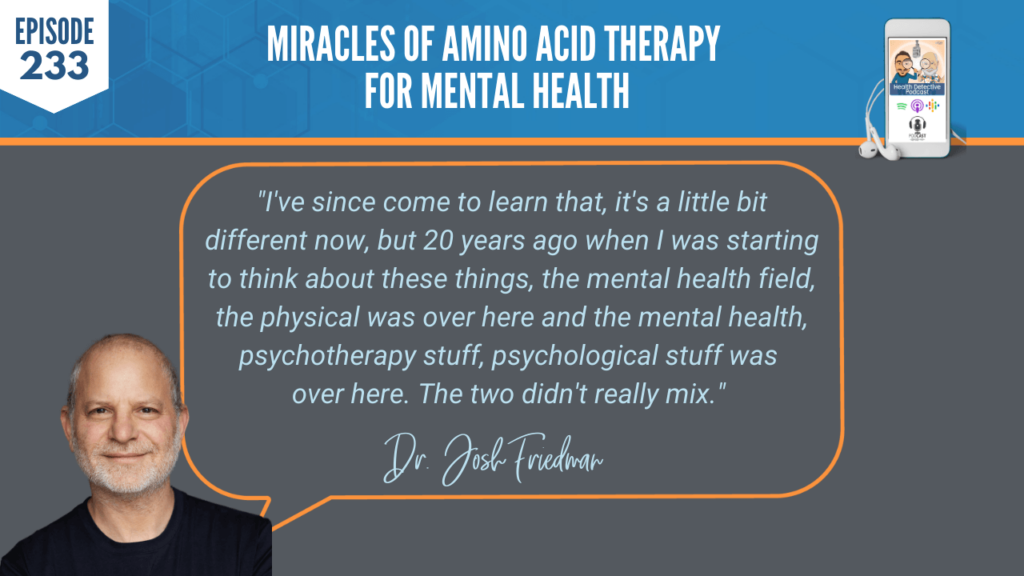
I thought, oh, I must have not explained it well enough. So, I said, the whole three-minute speech again, and same thing. They weren’t interested. I’ve since come to learn that, it’s a little bit different now, but 20 years ago when I was starting to think about these things, the mental health field, the physical was over here and the mental health, psychotherapy stuff, psychological stuff was over here. The two didn’t really mix.
And the only interventions for the physical side were, at that point, really medication. I came up as a psychologist in the heyday of the latest medications. I came up right when Prozac was happening. On the cover of Time Magazine was Prozac and it was going to be the end of depression. Of course, what we’ve seen is much more complicated than that.
From that day forward, I realized I was never going to be a psychoanalyst. I was going to do therapy, I was going to learn the best therapeutic techniques I could, but I was also going to learn other things.
Amino Acid Therapy: Learning & Incorporating

So, I became a yoga teacher. I learned about breathing and about embodiment. Eventually, I went to FDN. I’ve tried to piece together trying to help people figure out what the low hanging fruit is for the physical sides of mental health conditions. That’s sort of the lane I’ve settled in.
[00:09:10] Detective Ev: Awesome. What’s really admirable about this is you are someone who, like you said, you’ve been doing this for a while and you’re very active in the FDN community. I always see a lot of your posts and stuff. Still, out of all the things you’ve learned, this is an essential part of the practice.
I love bringing people like you on, mental health or not, just to see, all right, 20 years, 30 years of studying, what have you come up with? What got to the top of your list out of all these years? This stuff matters, and yet it’s still not talked about much. You have this kind of revolutionary experience. And for whatever it’s worth, I’ll keep it short, but I’m not an expert in the amino acid therapy yet, but I knew it worked.
I trusted you with it. I gave a friend, about two years ago now, The Mood Cure by Julia Ross. I’m like, listen man, I’m sorry. Really, I wish I could have explained this to you a little better. But I need you to read the book and do the chart that’s in it. Fill it out, and I can hook you up with the supplements. But you need to figure that out.
Amino Acid Therapy: Specific Protein Fragments for Specific Conditions
Two days went by, and that guy called me. He went from angry, just lost his girlfriend, all this stuff. He’s like, what is this? He’s not into our space with all due respects, so like he doesn’t really get even like basic protein stuff. I’m like, if I could explain to you how simple what you’re actually consuming right now actually is, and how safe this is compared to other things, you wouldn’t even believe me. I’m like, just keep doing it and we’ll work on some other stuff. Which brings up a topic we’ll kind of get into where this can motivate people.
So, how did this go training wise? I feel like you took courses in this, is that possible?
[00:10:32] Dr. Josh Friedman: So, I read The Mood Cure. Julia Ross was a therapist in the 1980s. She was a marriage and family therapist in California that was working with trauma and substance use. Also, she was working with eating disorders in like a group setting.
What she was finding was there was only so far her patients could go. She’s the pioneer. She was looking and got that there was something wrong with the way their brains were functioning, that there was a psychological part of their issues, but there was a real physical physiological part. So, she went to the literature.
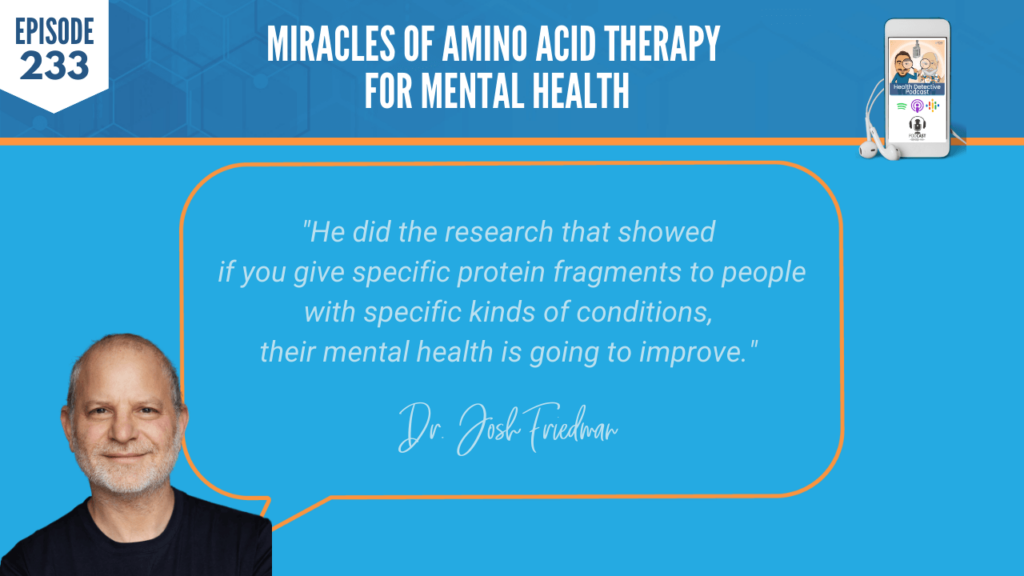
Now it’s very easy, you go to PubMed, and you type things in. She took months and months and ended up hooking up with this bench scientist named Ken Blum. Ken Blum is the father of amino acid therapy. He did the research that showed if you give specific protein fragments to people with specific kinds of conditions, their mental health is going to improve.
Amino Acid Therapy: Symptoms Resolved with Small Interventions
So, there was a marriage that was made. There was finally a clinician that wanted to try these tools with her patients and there was a scientist that understood it. Unbeknownst to her, Dr. Blum had been looking for Julia Ross or someone like her for many, many years because no one was interested. So, they started to administer programs to her clients.

What she found was depression got better, anxiety got better, PTSD got better, panic disorder got better from incredibly small interventions. She was using one or two pills of very specific targeted amino acids, a multivitamin, some essential fatty acids, some minerals, 10 supplements at the most. And people’s lifelong issues, they weren’t resolving, cause these were people that have had complicated trauma, were finally available to do the work that was necessary in therapy.
So, I read The Mood Cure. And this wasn’t like me cause I was pretty shy generally, but I was like, this stuff is too important for me to not move on. I called Julia Ross on the phone; I started conversing with her. I started to do supervision with her. At the time she was doing weekend workshops. So, I flew out to California and did a workshop with her. I bought all of the CDs. She had maybe five, they were CDs at the time.
Commuting to work, I would have my little CD Walkman player, and would be listening. Like all the FDNs I’ve met, I was voracious. I immersed myself in it. I’m sort of slow to implement so after about six months I was like, oh, I’m going to start using these tools. I found a couple of patients that had seen psychiatrists but had not responded well to medications.
Amino Acid Therapy: A Lineage of Experts
I started with myself. I personally, who have suffered from lifelong depression, anxiety, sort of had a very clear, very quick mood boost from boosting the serotonin pathways. Not knowing what I was doing, not knowing how to dose them, like as a pretty serious novice, I found 50% of people were responding positively.
I’ve since now studied with other people. But Julia still, she is the godmother of all of this. I owe a great debt to her.
[00:14:13] Detective Ev: I’d either forgot or didn’t know the part about, like actually calling her on the phone, going out and
training. That’s amazing.
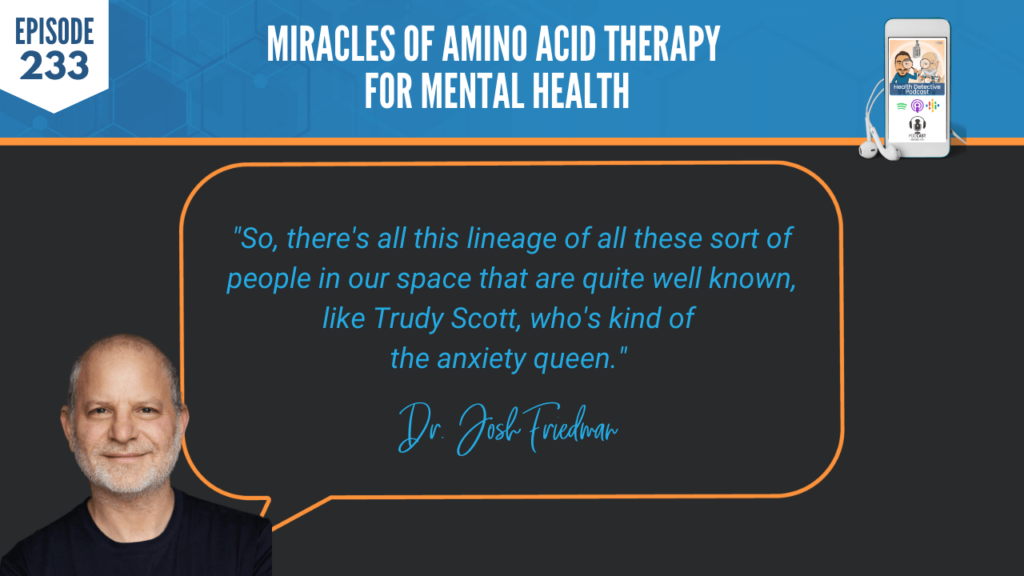
[00:14:19] Dr. Josh Friedman: I went out and I mentored. She would hire mentors for these groups. So, I went out and did that a couple of times. Then I got to know Trudy Scott. So, there’s all this lineage of all these sort of people in our space that are quite well known, like Trudy Scott, who’s kind of the anxiety queen.
She did the same thing. Trudy had pretty serious anxiety and panic attacks. So, she read The Mood Cure. She used the tools and was like, oh my God, what are these things? Eventually, she called Julia and then gave up her life in business to go work for Julia as a nutritionist. For a couple of years, she worked with her and sort of learned everything there was to learn. It was very serendipitous in a way, all of that.
[00:15:07] Detective Ev: I have so many thoughts going through my head, so I’ll jump into this one. And I know that I’m going to ask you some questions today that you might just have more an opinion on than an exact answer. That’s totally fine.
Amino Acid Therapy: Inflammation
One thing that you hear a lot in the functional health space is this idea. I think many people acknowledge what we’re talking about, the idea that protein could help out. They might word it as simply as that. They might not get into the amino acids per se.
But there’s also a lot of evidence of this aspect of neuroinflammation. There’s actually a meta-analysis that’s been done with like people taking Motrin and it temporarily relieving the conditions of anxiety and depression, temporarily. Do you believe that there are separate causes there? Or is it that the neuroinflammation affects the neurotransmitters? Maybe you don’t have the answer, but I’ve wondered this cause I find that fascinating.
[00:15:52] Dr. Josh Friedman: Yes. I think it’s both. I think everything is multiply determined. So, I think there are often multiple causes, of course. There are multiple root causes of things.
I think probably that inflammation is the number one cause of all illness. Of course, the brain is the most susceptible organ to inflammation. Definitely there’s hypo functioning of the brain. There’s going to be hypo functioning of neurotransmitters, production and otherwise.

And if you can provide the substrates necessary to help the body push the pathways to make neurotransmitters, you’re going to be supporting the effectiveness of the neurotransmitters, brain communication, brain functioning in general. In all likelihood, if you do that at the same time as you’re dealing with the inflammatory issues, if you’re dealing with inflammatory foods, gut bugs, brain inflammation, more directly, you’re going to have a much more effective intervention.
Amino Acid Therapy: Methylation
I know there are people, you know, Kelly Brogan and some big people in the space, and there’s point to research that the monoamine hypothesis, the brain chemistry, the neurotransmitter hypothesis of mental health has been disproven. But in my experience these tools are so effective.
If it’s been disproven, maybe the problem is we don’t fully understand the mechanism of action of these tools. People will say that the mechanism of action of the psychiatric medicines of SSRIs, SNRIs, anti-psychotics probably have an anti-inflammatory component. That’s what’s causing the mechanism of action. So, I think it’s complicated.
And I think there’s another piece involving the methylation that psychiatry assumes that mental health conditions have to do with low levels of neurotransmitters. They’re a smaller number but the possibility that too many neurotransmitters are causing mental health problems as well. Like there are lots of chemicals embodied where there’s a sweet spot and neurotransmitters are probably one of them. Are you familiar with Dr. Bill Walsh?
[00:18:12] Detective Ev: I couldn’t rehearse all his stuff, but yes. He’s the blood guy, right?
[00:18:16] Dr. Josh Friedman: He does blood testing. And he’s interested in looking at under or over methylation. There’s a set of characteristics and he’s using whole blood histamine to assess someone’s methylation status.
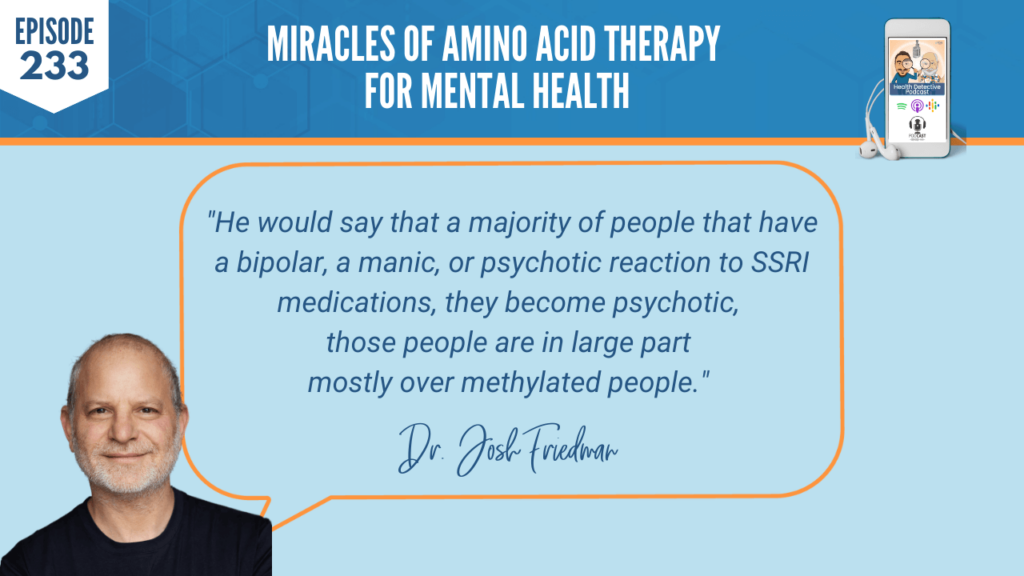
He would say that a majority of people that have a bipolar, a manic, or psychotic reaction to SSRI medications, they become psychotic, those people are in large part mostly over methylated people. He’s very, very interested in school shooters. There’s a very, very strong link between the epidemic of school shooting and treatment with SSRI medications. A lot of these kids execute school shootings after starting medication or raising doses of medication or stopping medication.
Amino Acid Therapy: Meds, Neurotransmitters, & Whole Blood Histamine

His hypothesis is these are people who have too many neurotransmitters to begin with, and if you push on their neurotransmitter systems using the powerful medication, that it throws them into a psychotic episode in which they commit crime, which is fascinating. He’s done his best to try to test as many school shooters for whole blood histamine as he possibly can.
[00:19:34] Detective Ev: Okay. That’s actually a fascinating topic here. You don’t have to be in this space to know that something’s going wrong here. I’m not advocating one way or the other, that’s not the podcast for this. But I’m just saying that we know there’s something missing.
Obviously, there was a time, even in America, my grandfather used to talk about this. He brought a rifle to school where he lived, and they would go hunting afterwards. Now, of course, again, different types of guns, so I’m not talking one way or the other. But he said it would never even cross his mind that someone there was planning on harming people. Now this is like happening all of the time. You kind of wonder what’s going on.
I had actually heard, and this is amateur researcher, I Google searched it basically. Someone made the claim online that like 90% of these people have been on SSRIs. So, I’m like, all right, well before I post that, I better check this out. I heard the opposite being argued, but there seemed to be more complexity to it. I admit this was a quick scroll on my phone. It wasn’t like I’m sitting down actually trying to research this.
So, it is accurate then that at the very least these people do have some history of medication use?
Amino Acid Therapy: Alternative Psychiatric Care
[00:20:34] Dr. Josh Friedman: Many, yeah. There are two sides to the argument. You could say, of course they have experiences with medication cause they’re mentally ill. So, they’re kids that are identified, involved with psychiatry or mental health in general.
But it’s pretty rare for someone to begin to think, could there be a causal link between actually the use of medication worsening brain chemistry imbalances in a subset of kids that are on them? Because the truth is, even though there are lots of school shootings, most kids who take medicine aren’t shooting up schools. But are there dangers in a subset of people that could potentially be identified for cautious use of antidepressants?
Often what happens in clinical settings is someone feels worse on the medicine. The natural inclination is to raise the dose rather than to say, hey, wait a second. Why is this person having the reaction they’re having? I’ve seen that many, many times. I’m not saying it’s every case.
One thing that’s been advocated by people that I respect is, what if psychiatrists who prescribe medicine were able to identify people at higher risk for adverse reactions to psychiatric drugs? A very simple way is to order a test like that measures methylation status. Which is, you know, a $60 test available that any ordering provider can order for whole blood histamine. That would provide a huge amount of information to the psychiatrist to say, oh, this person is over methylated, they have low whole blood histamine, and that they’re likely to have a potentially dangerous response to certain classes of medication. That would be really helpful to know.
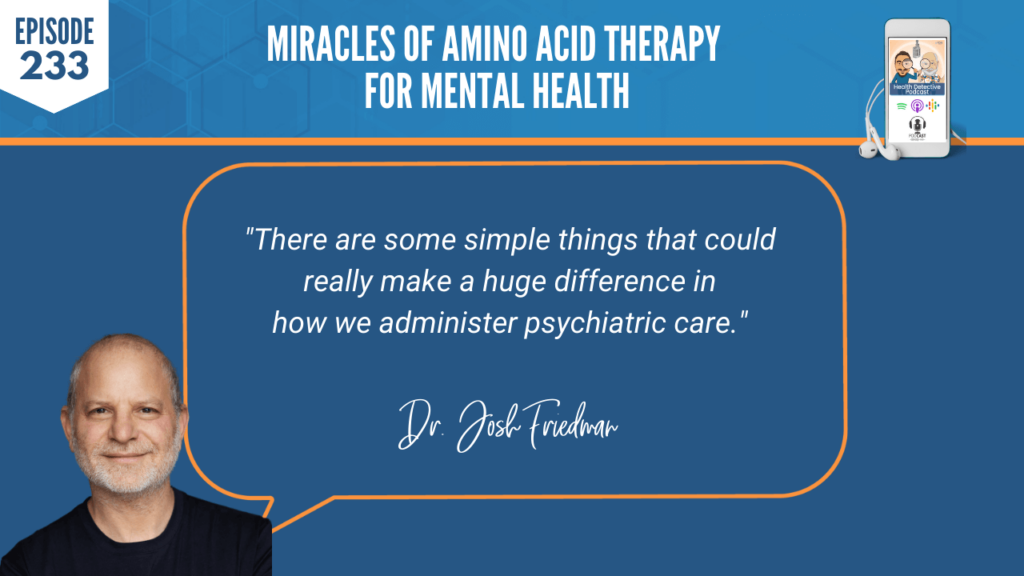
There are some simple things that could really make a huge difference in how we administer psychiatric care. That’s just one of many.
Amino Acid Therapy: Should We Be Making Them Famous?
[00:22:43] Detective Ev: Okay. Obviously, it’s not the main topic of today, but I know that, and rightfully so, you’re very passionate about the solutions that could be possible to the school shooting thing. I have to throw something out there then, because even selfishly I admit it’s something that I backburnered.
You know, I speak in schools. And I’ve had these visions, admittedly sometimes where I’m like, okay, if I was a person that was already in such an incomprehensible state of mind to do something like this, I’m thinking about myself in an assembly, I’m like, that would be a spectacle for someone this sick that wants to do this. I’m in a vulnerable position. I’m standing right up there. And like, I know this is probably unrealistic, but I worry about that.
The one question I have then while we’re on this topic, I gotta ask. I know that we should honor victims. Of course, I’m not saying that. Are we doing more harm than good by talking about these people, the shooters in the news? Even if it’s a medication induced thing, perhaps, there’s still a reason that they’re going and doing that act and not a mall shooter. I mean, I know there’s mall shooters as well, but like the school shooting thing is specific.
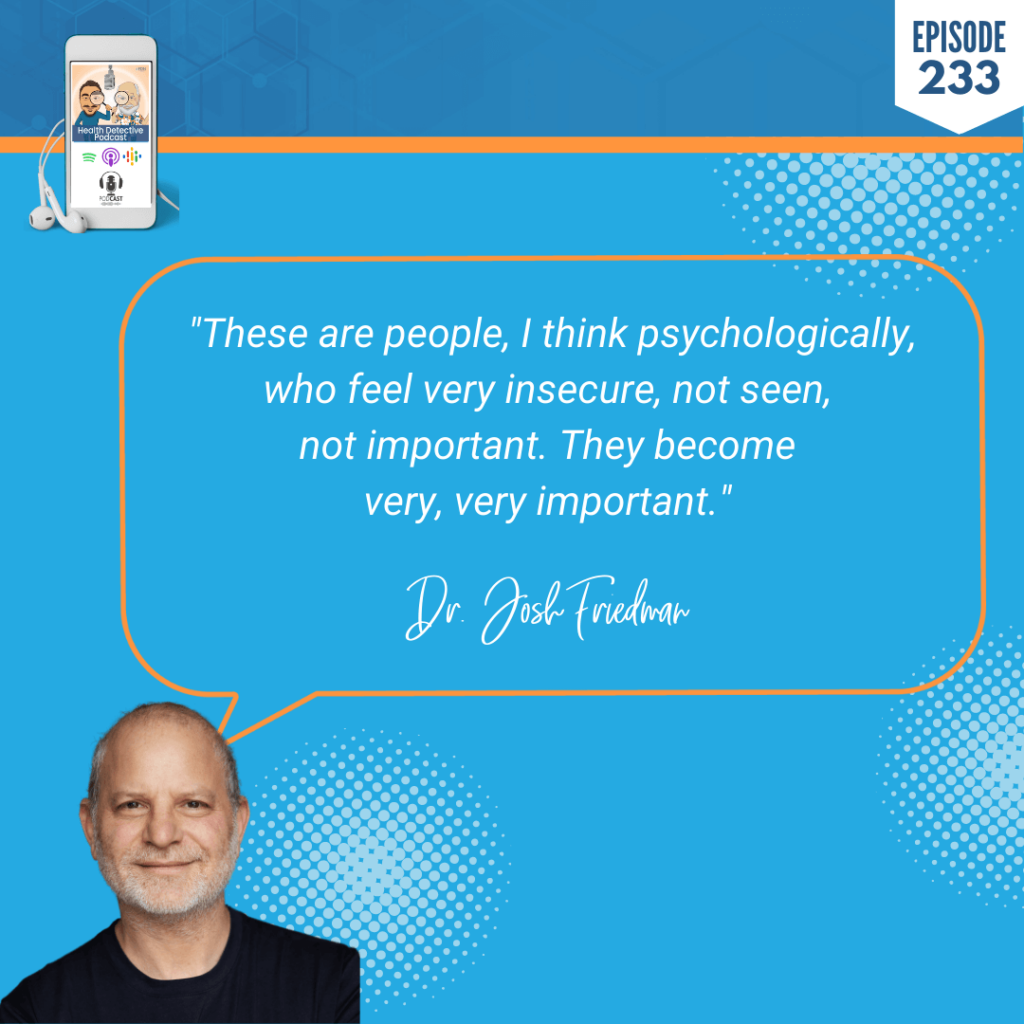
[00:23:40] Dr. Josh Friedman: It’s a very, very public act that derives a huge amount of attention. The whole world focuses on this one actor for a period of time. These are people, I think psychologically, who feel very insecure, not seen, not important. They become very, very important. Then other people want to do what they have done to get the same kind of experience, like infamy. It’s a path towards infamy in a way.
Amino Acid Therapy: A Solution is Needed
[00:24:11] Detective Ev: Listen, I don’t know why that I have the exact answer for this. Perhaps then we are doing more harm than good by like, all right, let’s share their name with the world.
Dr. Josh Friedman: Oh, I think so.
Detective Ev: Okay. I know the Nashville shooter had literally called the news outlets before they went. If that’s not proof that we’re making this worse by doing that, I don’t know what is.
Dr. Josh Friedman: I agree.
Detective Ev: You know what, I’m glad that you brought that up. It’s a sad situation.
[00:24:31] Dr. Josh Friedman: And it’s peripheral, I know. I know, it’s peripheral.
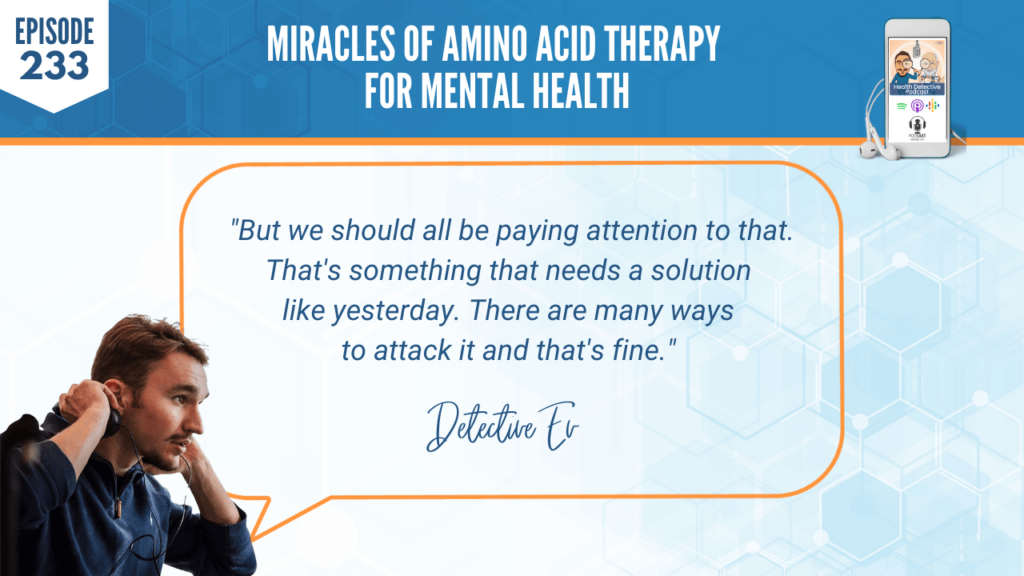
[00:24:34] Detective Ev: Yeah. And that’s okay. But we should all be paying attention to that. That’s something that needs a solution like yesterday. There are many ways to attack it and that’s fine.
All right, I’ll move on to the next thing. So, in terms of the amino acid stuff, I don’t know if you have any other ones that you want to bring up. Well, actually I was going to ask testimonials. I got thrown off.
Before I get into stories that have worked really well with this, one thing you mentioned about Julia is that when she was working with these people, you said, it’s not like they’re better overnight because some of these cases are very complicated trauma. But that still implies that this is moving the needle, at least to some degree.
Amino Acid Therapy: Quick & Effective
When I’m in a school, I use the example of a best friend of mine, he passed away. His name’s Joe, and he passed away from a drug overdose. Now Joe, it’s not really my job to share this on a public podcast, I’ll just say, almost movie level plot to his life and the abuse that he experienced. Then you have me that, listen, life wasn’t perfect, but it was pretty dang good, man. And yet we both dealt with similar symptoms.
So, is this hopeful for even people that have been through serious traumatic abuse experiences?
[00:25:33] Dr. Josh Friedman: Yeah, I think so. You know, when people think about nutrition and they think about their mental health symptoms, their expectation is for a small amount of change. What I say to them, which I learned from Julia, is we’re looking for cataclysmic change. We’re looking to rock your world, to have you feel hugely different. That these tools are at least as powerful as medication can be. And if they’re not, you’re not on the right one, or this isn’t the avenue you need to be looking at.
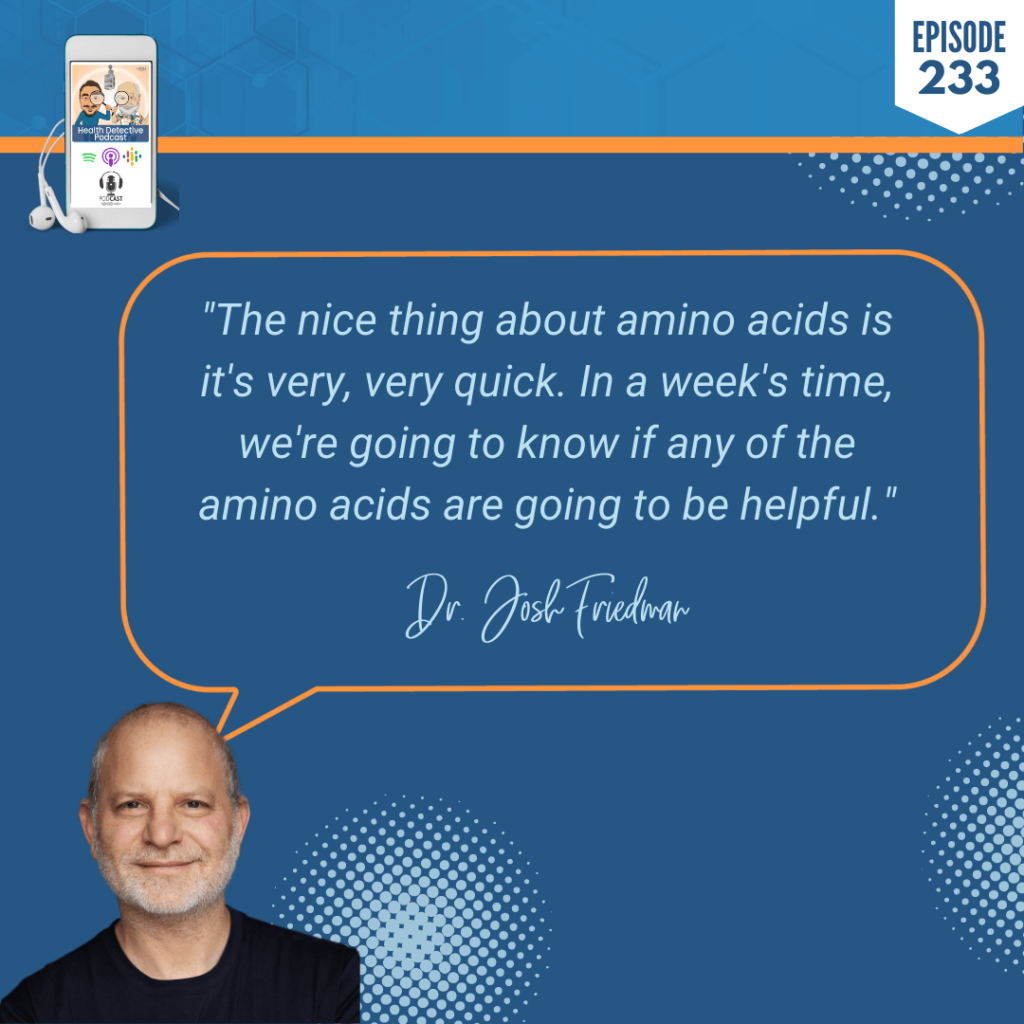
The nice thing about amino acids is it’s very, very quick. In a week’s time, we’re going to know if any of the amino acids are going to be helpful.
[00:26:20] Detective Ev: That’s so hopeful. It’s amazing and cheap.
[00:26:22] Dr. Josh Friedman: And it’s going to be huge benefit. I mean, in some people it’ll be a small benefit. I think it’s interesting cause I’ve been studying the organic acid test.
Amino Acid Therapy: Four Main Amino Acid Categories
I was taking a class with Dan Kalish, who I think is a great teacher. Their neurotransmitter markers for dopamine and serotonin on the organic acid test. If someone is low on those markers and low on certain amino acids, he will suggest specific amino acids to correct the low neurotransmitter markers.
But in my experience, he’s just giving a generic amount without really paying a lot of attention to it. And I think it’s a huge mistake. I think the chances are that people may not have as big a benefit unless you really fine tune the amount of the amino acid you’re given.
Here’s what I tell people to do. There are really four main categories we’re looking at with amino acids. I’m going to send you Julia Ross’s amino acid therapy chart.
Detective Ev: Oh, thank you.
Dr. Josh Friedman: Which maybe you could post, cause I think it’s an amazing document. It teaches people to think about what they’re looking at.
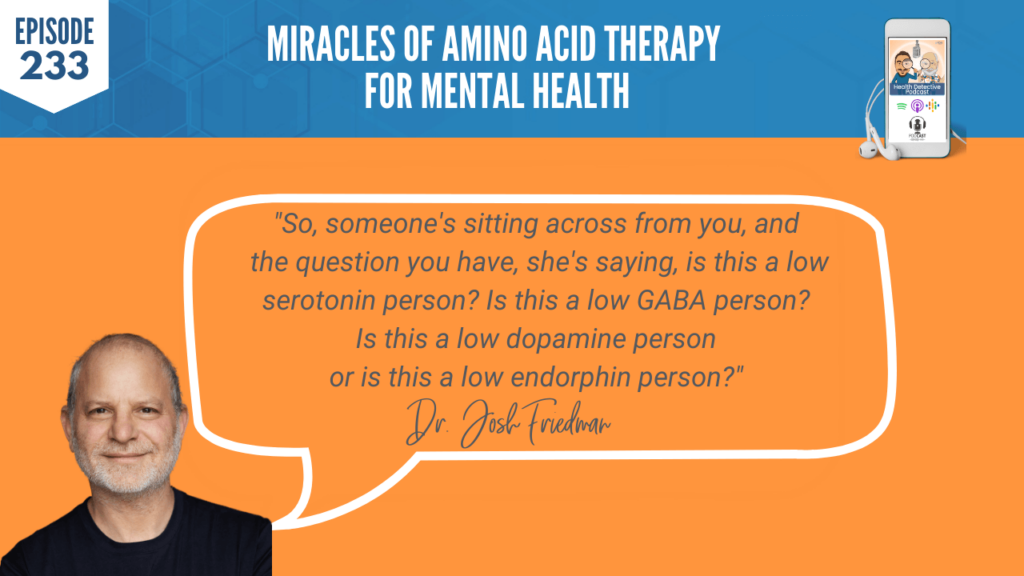
So, someone’s sitting across from you, and the question you have, she’s saying, is this a low serotonin person? Is this a low GABA person? Is this a low dopamine person or is this a low endorphin person? Those are the four areas. And then she includes blood sugar as sort of a fifth area. But she’s saying train yourself well enough so five minutes into a conversation you can tell what supplement they need.
I have another mentor. He was a beautiful, lovely man who just died. His name was Dr. Charles Gant. He would go to AA meetings, and he would look around the room and he would go serotonin, dopamine, serotonin, GABA. He would train himself to look at someone, to hear them utter a few sentences and know what supplementation they needed.
Amino Acid Therapy: A Quick Pencil & Paper Inventory
So, when people will say to me, they’re like, oh, you’re not going to test? You’re not going to test me to see which neurotransmitters are off? I say to them, I’m the test. And I’ve done it long enough where, I used to do neurotransmitter testing, but I found it confused people. I found it just as effective to use a quick pencil and paper inventory and go from there.
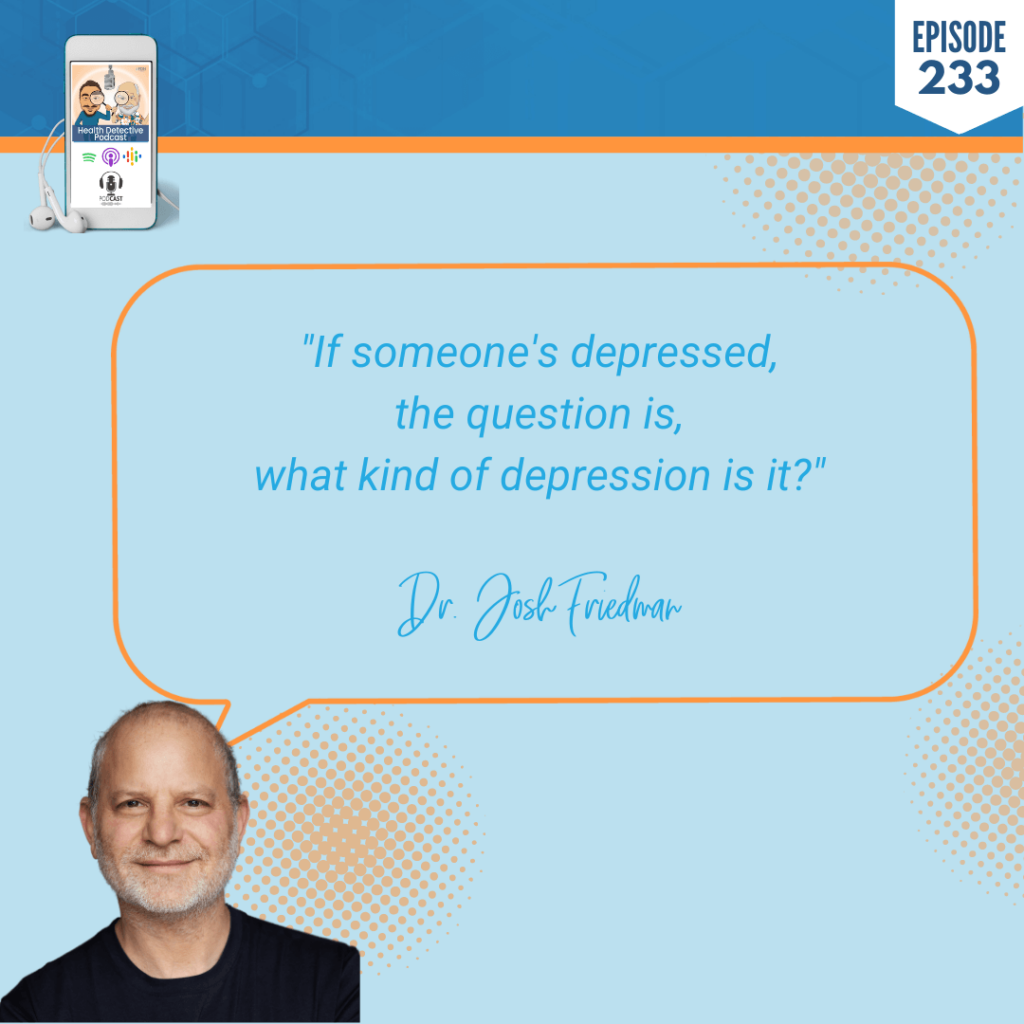
Here’s how to think of it. So, low serotonin and depression. This is sort of how a good psychiatrist would think, cause they’re thinking, what’s the presentation here? If someone’s depressed, the question is, what kind of depression is it? A low serotonin depression is an agitated or anxious depression.
What does that person look like? They might be pacing, they might be tapping their foot, they’re ruminating, their mind is going too fast. They’re having difficulty eating. They might be having suicidal thoughts, be having outbursts, can’t get comfortable in their own skin.
That’s very different than a low dopamine depression. Dopamine is, we think of it like pleasure, motivation, attention, concentration. I usually call that “Eeyore Depression”. In psychotherapy terms, they’d say that person is psychomotor retardation. They’re stooped, they talk slowly. They sleep too much. They eat too much. You might think of them as low thyroid. They’re not motivated, they’re not excited by life at all.
So, if you can start there and identify, on the amino acid therapy chart, she lays out these two areas. Then she lays out GABA. GABA is the part of the brain that has to do with more physical tension, so bodily tension, stiff muscles, anxiety, difficulty sleeping. Like sort of people in our world, we would think of low magnesium types, low potassium types.
Amino Acid Therapy: Assessing & Titrating
Then there’s the endorphins. Low endorphin people tend to be sensitive to pain. And that pain could be emotional, or it could be physical.
Julia Ross calls the supplement DPA, D-phenylalanine, in which boosts the endorphins as the breakup pill. They’re people where their heart hurts, everything is too much. They can’t tolerate what life has to offer. And the more you can begin to see the difference between these people, you can begin to address.
I’m thinking, let’s focus on calming your mind a little bit. Let’s focus on your agitation. Let’s focus on your compulsive, your OCD. You just start them on, here’s what we’re going to do. We’re going to give you one dose of tryptophan or 5HTP. These are the two amino acids that address serotonin. If you have more symptoms at night, we’re going to give you one before dinner, one at bedtime. Or if you’re suffering all day, we’re going to give you before breakfast, before lunch, before dinner and bedtime.
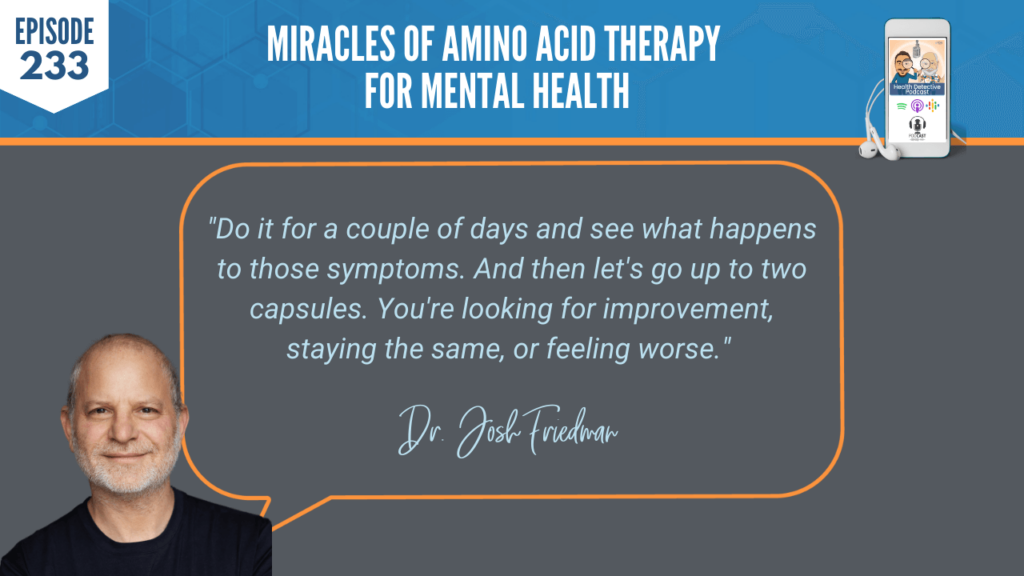
And your job and the people around you is to sort of figure out like what four symptoms are that you would like to see different. Let’s give it a number on one to ten. Let’s say it’s you can’t sleep; your brain is racing. You’re depressed and anxious. Do it for a couple of days and see what happens to those symptoms. And then let’s go up to two capsules. You’re looking for improvement, staying the same, or feeling worse.
Amino Acid Therapy: Low Serotonin Symptoms
The goal is to go up far enough. Let’s say you take one capsule; you don’t notice anything. You take two capsules, and you start feeling brighter or lighter. You take three capsules, you’re like, oh man, my mind is calming down. I’m not compulsively eating, I’m settled. You take four capsules each dose and you feel worse; your dose is three capsules. That’s really so effective and so important to find that right dose.
[00:33:09] Detective Ev: Okay. This is great. I’m thinking about myself just cause that’s an easy example to use. Even knowing what you just told me, I’m thinking, okay, well I didn’t eat much. I had a terrible time sleeping. I was angry as can be. My allowing that anger to take over is what got me kicked out of school. I was miserable but not necessarily unmotivated in the traditional sense. I mean, just based off that I’m thinking, okay, the serotonin one, right?
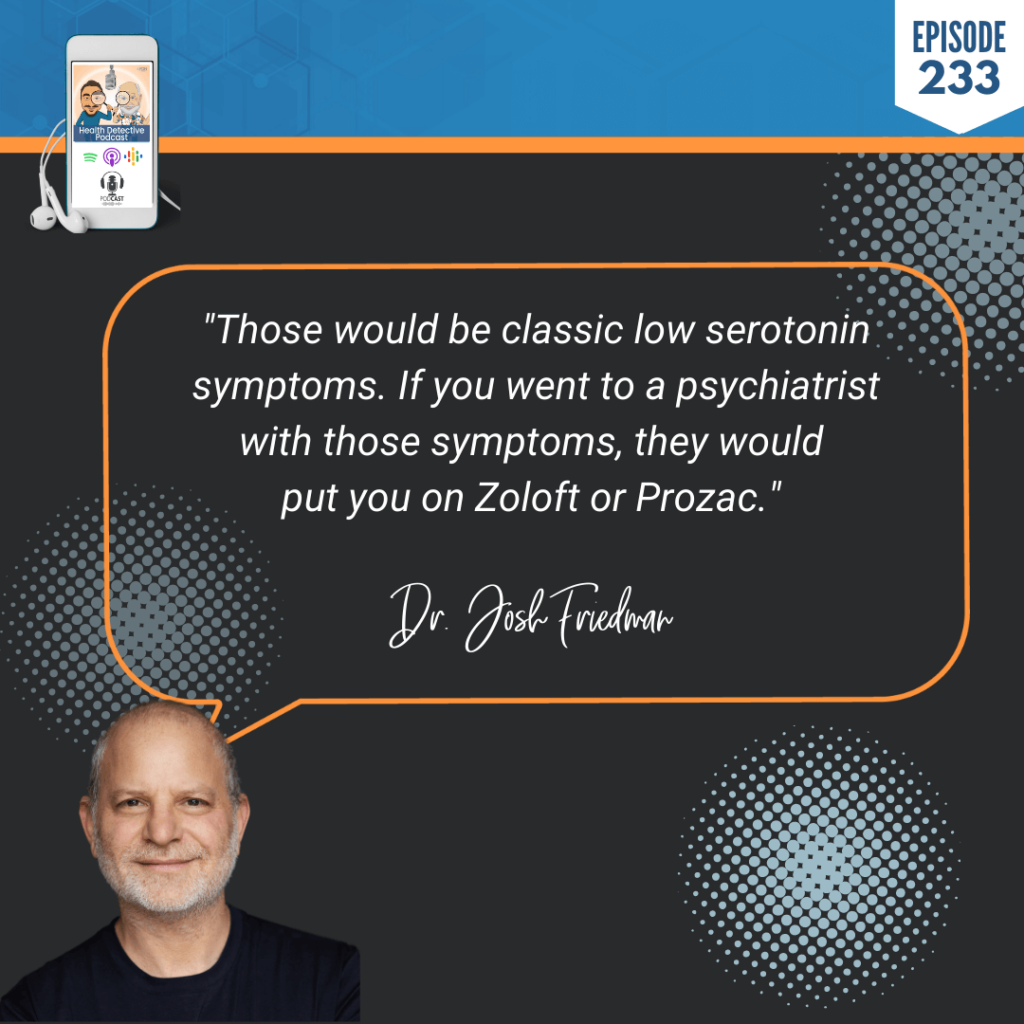
[00:33:30] Dr. Josh Friedman: Yep. Those would be classic low serotonin symptoms. If you went to a psychiatrist with those symptoms, they would put you on Zoloft or Prozac.
[00:33:40] Detective Ev: Which is exactly what I got, I got Zoloft.
[00:33:41] Dr. Josh Friedman: Yeah. In some people that would be amazing.
An interesting thing is, why does someone take Zoloft or Prozac? It doesn’t work. And why do they take amino acids? And they do work. Often people will come to me who have tried the traditional route. Cause the truth is most people aren’t seeking out a FDN or an amino acid therapist, and it’s fine. It’s way easier to take one dose of Prozac a day and it changes your life. We never see those people.
Amino Acid Therapy: Low in All Four Categories
The government did research on antidepressants. How well are they working? It was called the Smiles Trial. They found that antidepressants work, they help with 50% of symptoms in 50% of people. It’s not that great actually.
I’ve been around a long time, some people do really well on antidepressants. They get on them and stay on them, it’s no big deal. It’s our job to figure out the other people.
But going back to your thing. Yeah, those are low serotonin.
Some people are going to be low in everything. What do you do then, is the question. There are targeted amino acids. Targeted amino acids would be tryptophan, 5HTP for serotonin; GABA, different forms of GABA for GABA; tyrosine or DLPA, DL-phenylalanine for low dopamine; and DPA for low endorphin. But what do you get?
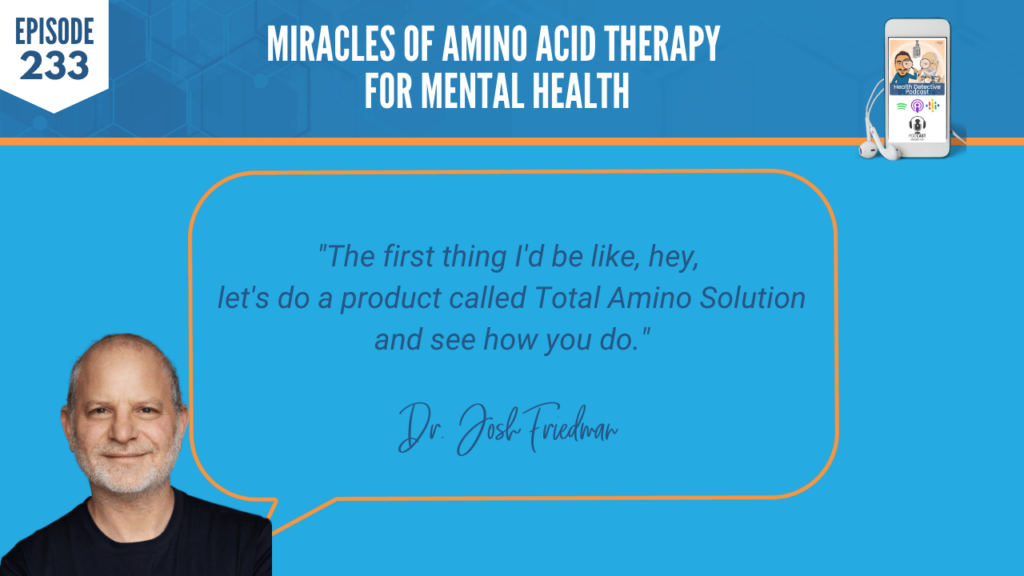
In this day and age, people come in and they’re like, well, I have all of these. What do we do? Here’s an interesting thing. There are broad spectrum amino acids. So, if someone came in and they were like, oh yeah, I’m low dopamine, I’m low GABA, I’m low endorphin. The first thing I’d be like, hey, let’s do a product called Total Amino Solution and see how you do.
Then I would say, how’s your digestion? Because the thing to remember is if hydrochloric acid is low, if people are protein malnourished, if people aren’t able to absorb protein because of gut dysfunction, there are no amino acids in the system to be used for brain chemistry. If people are zinc deficient, low levels of zinc leads to low levels of hydrochloric acid.
And no hydrochloric acid people are on PPIs, protein pump inhibitors to decrease heartburn, which leads to a disaster of no protein. No amino acids available.
Amino Acid Therapy: How is Brain Chemistry Made?
[00:36:28] Detective Ev: I was prescribed one. It’s just weird looking back at all the channels of stuff, you know. Cause that came right before the depression, or right around the depression.
[00:36:35] Dr. Josh Friedman: And I think PPIs alone can cause depression. Because if you think about it, Prozac does nothing to create neurotransmitters. It just makes more efficient use of whatever neurotransmitters are in the system.
[00:36:50] Detective Ev: That could be a reason why it doesn’t work for some people if they’re not getting it to begin with.
[00:36:53] Dr. Josh Friedman: One of the first cases that I worked with these tools on was an anorexic girl who was on Prozac, who was having minimal benefit.
I said, Okay. What are you eating? Oh, you’re eating lettuce and almost nothing. How much protein are you eating? We did the calculation, like she would just eyeball it. She’s having 10 grams of protein a day. So, basic education about neurotransmitters. How are they produced? Like how is brain chemistry made?
It’s made from protein. Oh, you can only use amino acids if you eat enough of something, and you break it down into the substrate amino acids. Oh, you can only turn those amino acids, you can only turn tryptophan into serotonin if you have specific enzymatic co-factors, which are rate limiting. So, if you don’t have enough B6, if you don’t have enough magnesium, if you don’t have enough zinc, the whole process slows down. That’s not to mention any of the genetic SNPs that can influence.
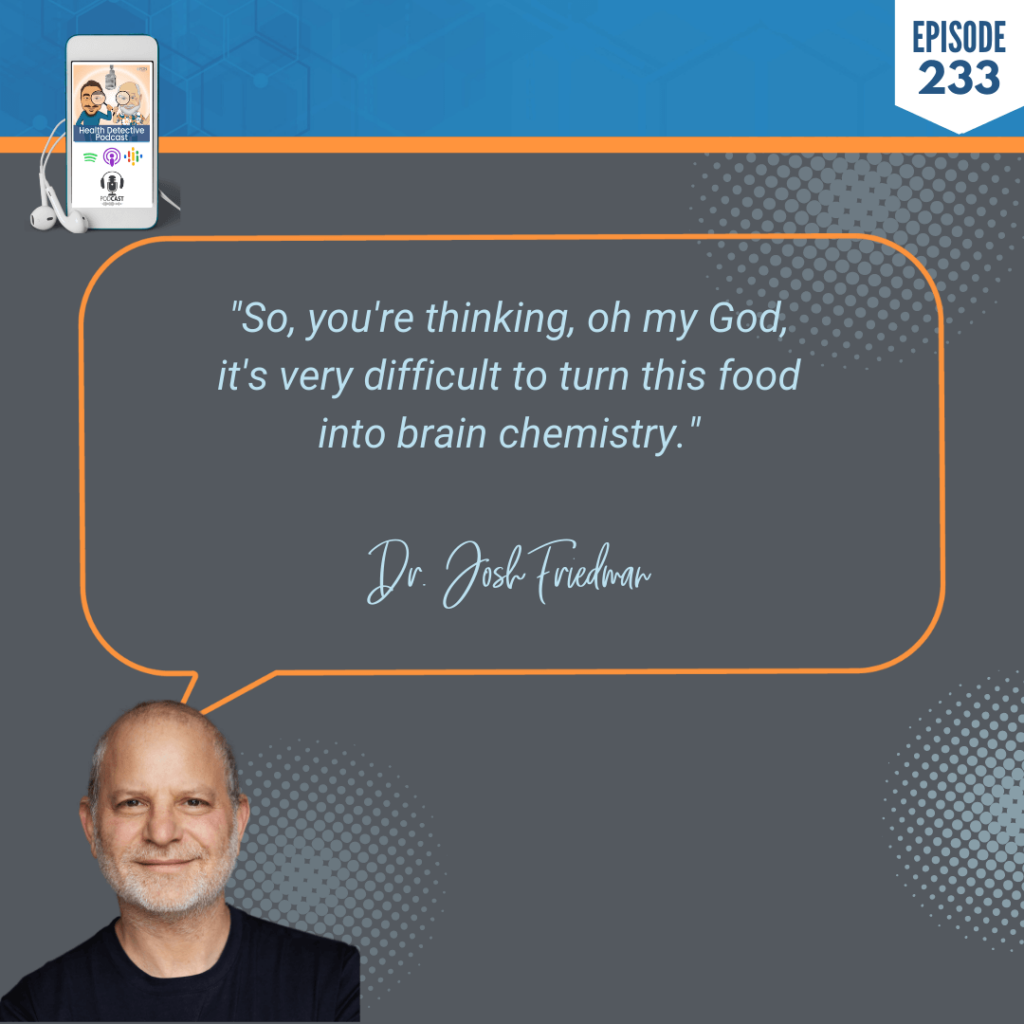
So, you’re thinking, oh my God, it’s very difficult to turn this food into brain chemistry.
Amino Acid Therapy: Client Success Stories
We gave this anorexic girl who was willing to take supplements, 500 milligrams, which is the starting dose of tryptophan, twice a day. It was all she would do, and her mood started to lift after a couple of days. She started to get less rigid in her thinking. She started to say, oh, I think I need to eat a little bit more, so I can have energy, so I don’t pass out anymore. It was like, it was amazing.
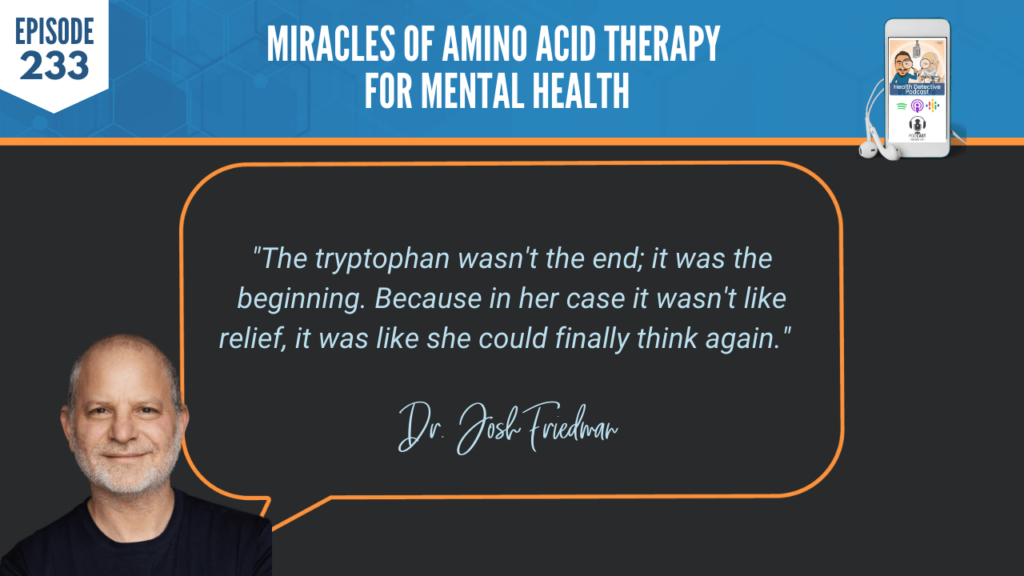
The tryptophan wasn’t the end; it was the beginning. Because in her case it wasn’t like relief, it was like she could finally think again. Cause her brain really kind of had been offline, stuck in these rigid eating disorder patterns and thoughts.
[00:39:09] Detective Ev: Wow. I know this might be a while ago, so I don’t know if this automatically comes to your head. So, I remember listening to a podcast you did. Really, I don’t know if it was during this time, but I remember you posted something during the pandemic. I vividly remember I was walking cause I was so bored. Normally, I would walk three miles to the grocery store and back every day. I remember hearing about this gentleman who came in. It was rather dramatic where he basically had a weapon and said that he was going to take his own life. But you turned him around.
[00:39:35] Dr. Josh Friedman: Yeah. He was amazing actually. He’s about 10 years back. He was one of the first people I did functional medicine testing on. He was desperate, had been hospitalized, had been an alcoholic and lifelong depression. His situation was made much worse by being put on psych meds. He sort of became even more hopeless. They upped the dose.
Amino Acid Therapy: Turning A Life Around
We did some food sensitivity testing, not MRT, it was before MRT. Did some IgG testing, an organic acid test, and we did HTMA. I didn’t know how to interpret these tests very well at that point cause I didn’t know all the ratios, HTMA ratios. Honestly, I did the wrong hair test. I did a doctor’s data test and not Trace Elements blah, blah, blah. But what we did find out was enough to turn this life around.
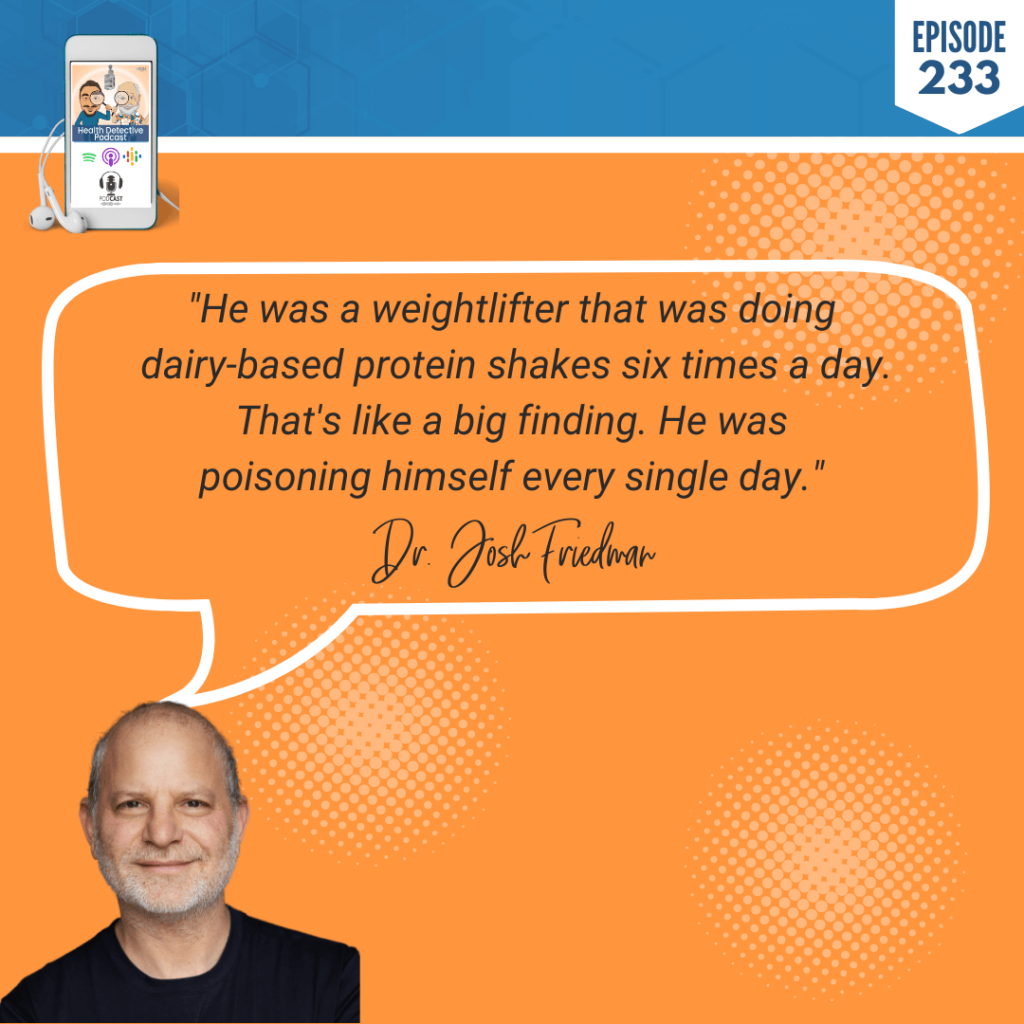
On the test, we found, and I say we found the usual, like we were looking for the usual suspects. So, what did we find on this guy? We found a very significant allergy to dairy. Why was this important? He was a weightlifter that was doing dairy-based protein shakes six times a day. That’s like a big finding. He was poisoning himself every single day.
On the hair test we found low levels of lithium. We later found out that he came from an area of Texas that had very, very low levels of lithium in the municipal water, just by chance. Because I read, there’s an amazing study that looks at lithium levels in the water in every county in Texas. And if you take every county in Texas and you plot it on a graph, and you plot suicidality and homicidality in those counties, there’s an inverse relationship between the counties that have high lithium in the water and low incidence of suicide and homicide. It’s a near perfect correlation.
We put him on lithium, we put him on some lithium orate, low level lithium, not pharmaceutical, supplemental. We also found low levels of serotonin and dopamine, the markers on the OAT, which is the urine markers, not the best markers.
Amino Acid Therapy: Enabling Clients to Move Forward
We put him first on serotonin support. When he settled down, we put him on some dopamine support and his life turned around. A week or two into this he called back and said, this is amazing; I haven’t felt this way since I was a kid. He was like done. I was his last person. I was like, oh, snap. I’m his last person.
I still felt new at this. It was just very rewarding. Then he wrote me, four years later. I lost track of him. He had referred other people, his brother who had similar issues, friends. I’ve been free of depression for all this time, four years, is what he said.
Now, he had started singing and he wanted to become a recording artist. So, he had done all this amazing stuff in his life. He’d had a romantic relationship for the first time. It was really incredible. But he had taken like very small little steps. That’s a testament, certainly to the testing.
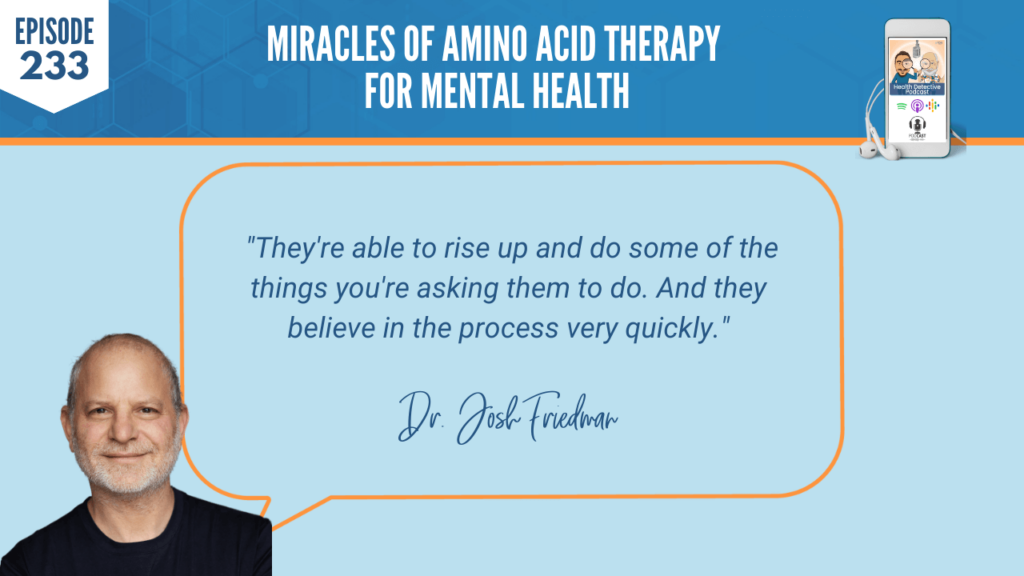
But as a first step with almost everyone, helping them with neurotransmitter support can be incredibly helpful. If you help people feel 20% better immediately, you get buy-in from them. They’re able to rise up and do some of the things you’re asking them to do. And they believe in the process very quickly.
The cool thing about amino acids is when you’re at the right dose, they’re going to notice within 10, 20, 30 minutes, like it’s immediate. They’re going to have an immediate reaction.
[00:43:43] Detective Ev: Julia Ross has those stories where she said, occasionally, not every time, but occasionally she’d have someone come in the office and by the time that they were leaving they already felt better because she was getting that good at it. This is crazy to me.
Amino Acid Therapy: Serotonin Syndrome
I know I’m biased, but I love this topic. I think everyone’s going to feel this way of how fast this is going. If you guys want Dr. Friedman to come on and just share this endless knowledge it seems, again, please reach out to us. You guys know how to do that. DM us on at fdntraining on Instagram, and we’ll bring him back.
Dr. Freidman, one question I had to get to today cause there’s gotta be someone else that’s thinking this here, and I admittedly don’t know the answer to this. Is this contraindicated with the medicines or can someone try this out while being on a medicine?

[00:44:20] Dr. Josh Friedman: Yeah. It is not contraindicated. The general rule of thumb is taking amino acids four hours after your dose of medication. But if I was on medicine, if anyone’s out there, they’re on medicine, their clients are on medicine, I would find a practitioner to work with who can make sure there’s a theoretical risk of something called serotonin syndrome – too much serotonin. I wouldn’t advise people to self-treat if they’re on medicine, but it is possible.
I’ve worked with many people on medicines, but spacing them out, going even more slowly, staying in closer touch with a practitioner is the way to go. And Julia Ross has a list of providers that she’s trained on her website. I would be one of them. There’s, I don’t know, a hundred or so on her website.
Where to Find Dr. Josh Friedman
[00:45:14] Detective Ev: Well, and I might as well ask. Please tell us where can people find you if they’re like, this is my guy, I need to talk to him.
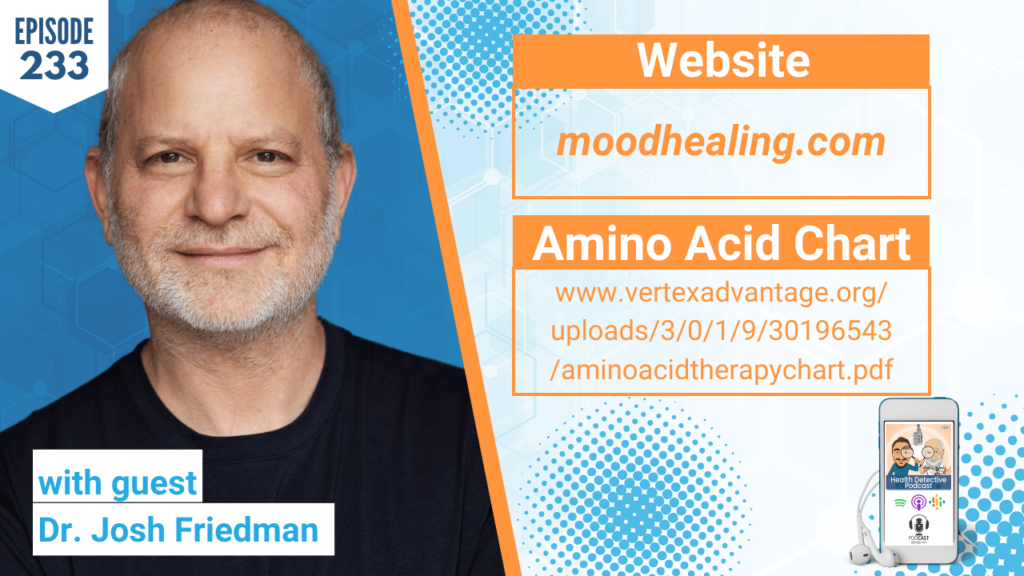
[00:45:19] Dr. Josh Friedman: My website is Alternative Mental Health Solution, that’s the name of my business. It’s moodhealing.com.
[00:45:29] Detective Ev: Excellent. I know there’s going to be a lot of FDNs out there that are excited. Guys, buy The Mood Cure. If nothing else, check that out.
Dr. Josh Friedman: Yes.
Detective Ev: Thank you for the advice with, you know, be careful with the self-treating aspect, especially if we’re currently using medication. Thankfully, for better or for worse, I feel like a lot of people that listen to this podcast might be rejecting medication.
Now, I don’t necessarily believe in that. I think you should try to feel as good as you possibly can. I know I’ve talked to them, and they might be struggling right now, but they don’t want to take the medication cause they’re worried about the risks with that. Hopefully this is something they can implement overnight.
And guys, what’s crazy about this, it is cheap. I remember Julia Ross saying in the book itself that she believed that just the simple answering of questions in the book was a more accurate way to measure which amino acid you should use. Then any blood draw or anything out there. Like, so for a $19 book and then some of the cheapest supplements you can imagine, you can really turn this around. It’s criminal to me that this isn’t talked about more even in a functional space.
Amino Acid Therapy: The Anti-Anxiety Food Solution
[00:46:22] Dr. Josh Friedman: I do think that the amino acid therapy chart is genius. I think the way that it chunks information, it trains clinicians to begin to think about very operational categories of mental health symptoms. She, on the chart, and I’m going to email it to Evan, on the chart it says, take these supplements at these doses. Here’s how you introduce them, how you titrate them up. You find your sweet spot. She shares in that book, all of the jewels. She’s old school, so just $20 book. She’s putting it out there.
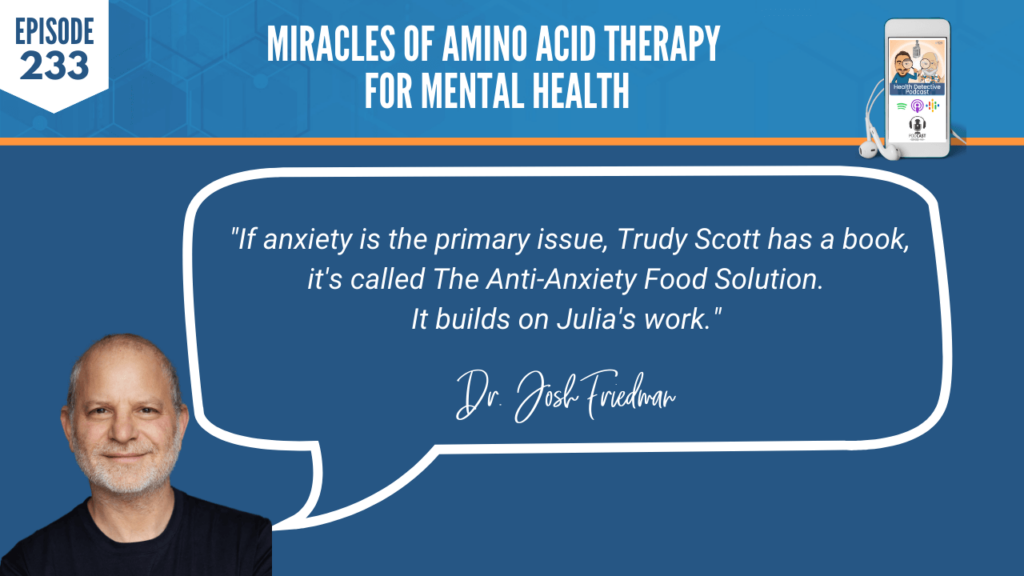
She knows that 30% or 40% of people will be able to do it themselves and get better. She then knows that some people are going to need more support. If anxiety is the primary issue, Trudy Scott has a book, it’s called The Anti-Anxiety Food Solution. It builds on Julia’s work. It’s more targeted for anxiety.
Trudy is a wealth of information in that area. She’s a real researcher, so she’s added to Julia Ross’s form, the amino acid therapy chart, with a few new sort of things in each of the amino acid areas. I’ll send that as well.
[00:47:43] Detective Ev: Excellent.
Dr. Friedman, this one might be more general, but it’s our signature question on the podcast. You can feel free to answer this any way you want, even though I know the topic was mental health today. But since it’s your first time on, the question is as kind of simple as this.
Signature Podcast Question/Conclusion
If we could give you a magic wand and you could wave it and get every single person in this world to do one thing for their health, so you can get them to start doing one thing, or you can choose for them to stop doing one thing, what is the one thing that you’d get them to do?
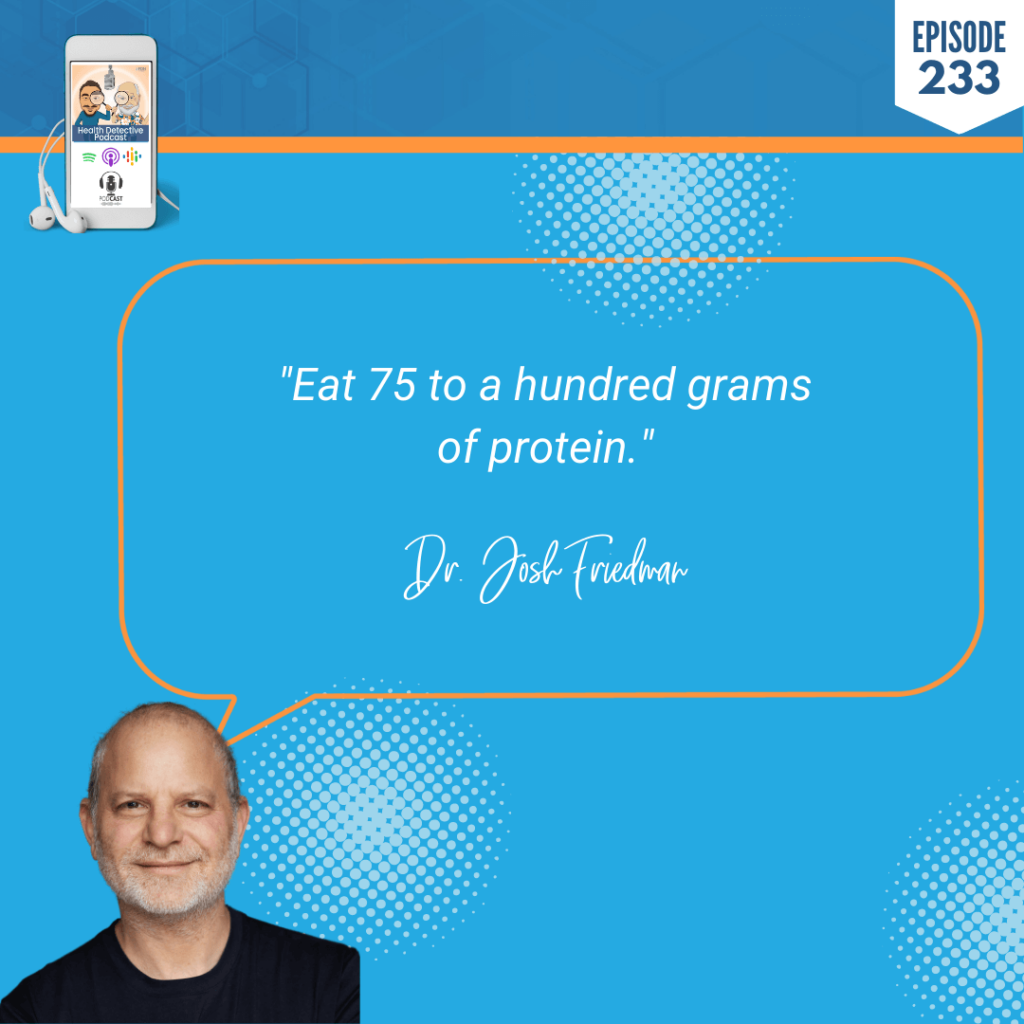
[00:48:10] Dr. Josh Friedman: I’m going to go with mental health. Eat 75 to a hundred grams of protein.
[00:48:17] Detective Ev: Sounds good to me. Thank you so much for coming on today and sharing this.
[00:48:19] Dr. Josh Friedman: Thank you so much for having me, Evan.
Detective Ev: Yeah.
You can always visit us at functionaldiagnosticnutrition.com.
For more informational and functional health related podcasts like this one, go to functionaldiagnosticnutrition.com/health-detective-podcast/.
To learn more about us, go to functionaldiagnosticnutrition.com/about-fdn-functional-testing/.

